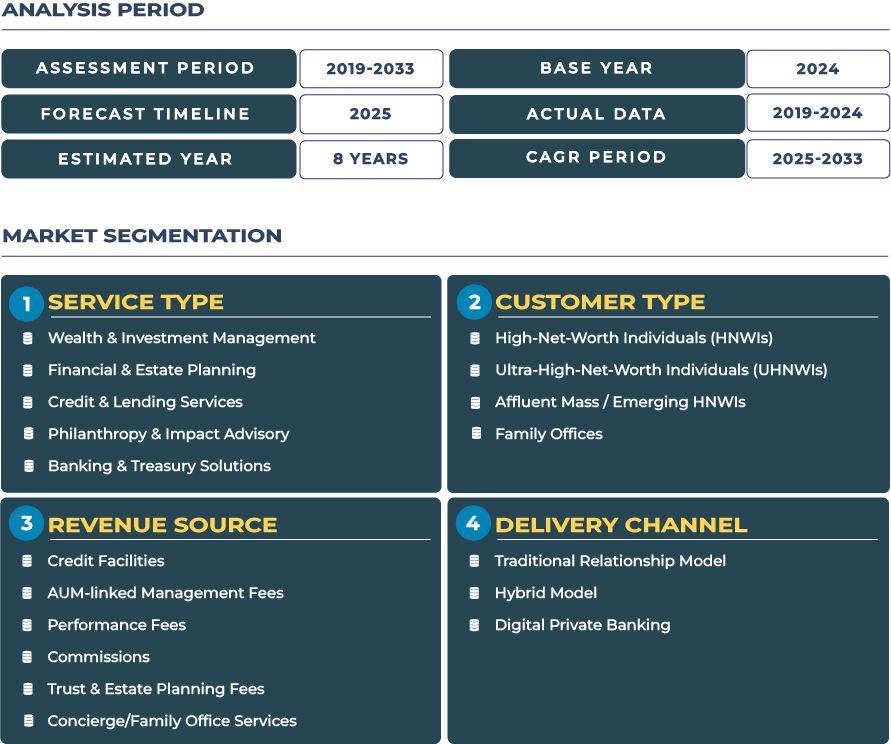Market Outlook: Mapping the Growth Trajectory in Germany Private Banking Ecosystem
The outlook for Germany private banking market is characterised by steady expansion and structural refinement. Projected to grow from USD 48.8 billion in 2025 to USD 69.8 billion by 2033 at a CAGR of roughly 4.6%, the market’s performance is underpinned by rising affluent-client wealth and shifting service expectations. Germany wealthy individuals and entrepreneurs increasingly demand holistic wealth-management platforms that go beyond traditional advisory to include credit structuring, payments/treasury integration and international mobility.
Note:* The market size refers to the total revenue generated by banks through various services.
Key enablers include Germany robust economic base, deep wealth-creation across Mittelstand business-owners and the stability of its banking system. According to the German national investment promotion agency, private-household financial assets reached around EUR 7.7 trillion at end-2023. However, the market is not without headwinds: margin pressure, heightened cost bases, regulatory demands and digital-disruption threats will test private banks’ ability to capture this growth. Institutions that pivot away from compartmentalised services toward integrated wealth-ecosystems-linking investment advice with payments, lending, liquidity and insurance-will be best placed to capture the 4.6% CAGR horizon.
Growth Catalysts & Structural Impediments: What Drives and What Restrains Germany Private Banking Sector
Germany Private Banking Landscape is Propelled by A Number of Strong Drivers
First, the wealth accumulation of business-owners and families supports demand for private banking advisory, estate planning and succession solutions. Second, rising digital-wealth adoption within Germany affluent clients enables banks to integrate services such as payments, lending and treasury functions into the wealth journey-improving stickiness and wallet share. Third, as geopolitical uncertainties and global mobility of wealth increase, German private banking firms with strong global-wealth capabilities stand to benefit from inflows and retained domiciliary positioning.
Nonetheless, The German Private Banking Market Faces Significant Challenges
Margin compression remains acute: major banks report cost/income ratios in the private-banking units at around 77% and pressure to reduce further. Inflation, rising interest rates and potential economic slowdowns could dampen investment flows and credit demand in the high-net-worth segment. Moreover, legacy operating models, fragmented service stacks, and slower transformation trajectories create competitive risks-particularly as wealth-tech and neo-banks target younger affluent segments. Regulatory and compliance burdens add to cost bases, making efficiency a core challenge for growth capture in a 4.6% CAGR environment.
Trend-Lines & Opportunity Frames: Emerging Dynamics in Germany Private Banking Market
A major trend reshaping Germany private banking market is the acceleration of digital-wealth engagement. Affluent clients increasingly expect mobile and hybrid advisory platforms encompassing investment services, payments, credit and treasury flows. ESG (environmental, social and governance) integration is also gaining momentum among German HNWIs, requiring private banks to embed sustainability-linked investment and lending frameworks. Additionally, alternative-investment demand (private markets, real-estate, private credit) is growing, especially as classic fixed-income yields compress.
Private banks in Germany can capture opportunity by specialising in next-gen wealth and family-office advisory-particularly as generational succession creates new demand for integrated services. Regional hubs such as Frankfurt, Munich and Hamburg, with dense wealthy populations and business-owner bases, represent key service zones. Firms that embed payments and treasury flows into the wealth-experience (e.g., real-time cross-border transfers, liquidity layering, securities-based lending) will deepen engagement and increase wallet share. Lastly, German private banks with strong international-wealth platforms can leverage global mobility demand and cross-border structuring to attract and retain affluent clients.
Competitive Landscape: Strategic Moves Realigning Germany Private Banking Value Chain
The German private banking market is highly competitive and undergoing significant strategic realignment. A leading institution, Deutsche Bank AG, has been recognised as “Best Private Bank in Germany” at the Global Private Banking Awards 2024, reflecting its focus on entrepreneurial and wealthy clients. In July 2025, Deutsche Bank announced a re-organisation of its wealth-management business in Germany to simplify leadership and boost fee-based revenues.







